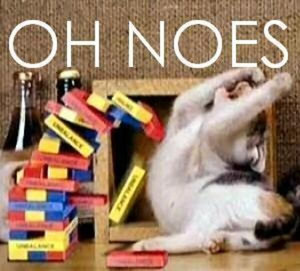It’s my belief that any story is, at its core, about relationships. Relationships between people or groups of people, usually: families, friends, lovers, enemies, warring countries/planets/galaxies, spies trying to outdo each other, whatever. A story about a boy and his dog making their way through the post-apocalyptic countryside is about a relationship. Or a story about a female fighter pilot and the only thing in the world she trusts – her plane – is about a relationship. Even a story about the last surviving scientist looking for a cure to a world-spread disease is about a relationship.
Now, my stories tend to examine relationships on a smaller scale, usually between two people, along with a supporting cast of eccentrics around them. Love stories. But it’s never just a love story. I like some kind of conflict (often external) that will rear its ugly head, and which my characters need to face together to overcome. Or die trying in the process.
My question, though, is – when you have an external conflict that the lovers must face – how much time can you spend building the relationship, first?
I like building relationships, myself, but in this age of short attention spans, if a storyteller spends a lot of time forging that alliance between the characters, will the reader get bored before the big ol’ conflict hits? What’s a reasonable amount of time to spend getting a couple together? What if I’m telling this story all wrong?!
Have you ever read a story and thought, “They would never get together that quickly!” Or, conversely, “Why is this truce taking so long?” What are your thoughts about this topic? I’d love to know!



Nice piece. I don’t think it matters as long as the tension is there. That can either be in the first stages of relationship, wondering, hoping, anticipating, discovering, risking (gosh the possibilities are endless!), or why not throughout the whole book?
I don’t think it’s necessary the relationship is established before outer conflicts occur either. Many real life relationships are forged against challenges. What really matters is that the reader wants to know always happens next, to be gripped, and I think that is the purpose of tension. It can be a vehicle for all sorts of more profound things, but without it the story can get stodgy. Thanks for the post!
Thank you, Anthony!
You bring up a lot of good points. (I know that my own relationships are constantly evolving!) Finding the right balance in a story can be tricky, though. I certainly don’t want to bore anyone!
Thanks again!
I don’t think there is any real way to write a wrong story, as long as you’re writing the story that you want to write. As you pass your story onto others to read, they’ll tell you what works for them and what doesn’t. If you consistently hear the same comments, then you should probably look into what they may say.
As it stands now, though, write the story the way you think it should be. Don’t lose your voice in the edits another suggests. After all, in the end, it is your story the way you think it should be written.
And don’t give up. 🙂
Thanks, Ottabelle. 🙂
I’m definitely trying to knock out all of the kinks in the story, but it helps to hear that stories coming from inside aren’t necessarily “wrong” – they just need tweaking like anything else.
Thanks again!